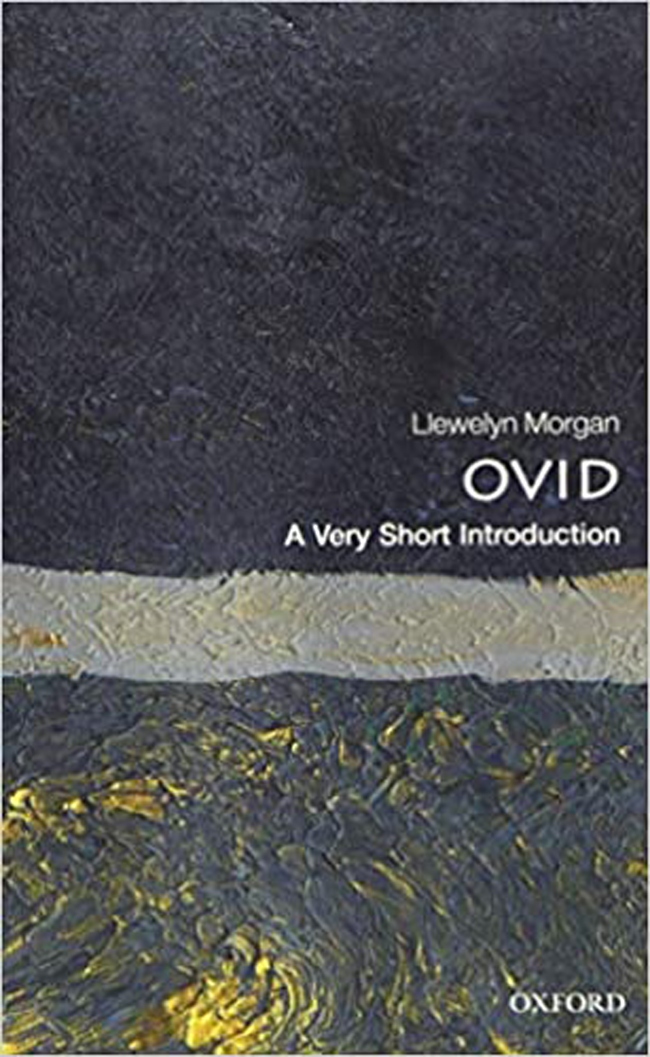
It has taken nearly 25 years for OUP to consider P. Ovidius Naso worthy of attention in their excellent series ‘A Very Short Introduction’. There are now 18 of these pocket-size books devoted to Classical topics and persons, including ‘Alexander the Great’, ‘Herodotus’ and ‘Homer’; there is, as yet, no ‘Augustus’, ‘Horace’, ‘Julius Caesar’ or ‘Virgil’. So Ovid, in whatever nook of the Elysian Fields he has his stall, can claim bragging rights where Latin poetry is concerned. Perhaps this is only fair, given the impressive influence he has exerted on later writers and storytellers in many languages.
It has to be said immediately that the publishers have found a first-class writer-academic for the job of describing Ovid's character and range, and explaining the appeal of ‘this scintillating Roman poet’. Llewellyn Morgan introduces the man concisely, then gives a chapter each, in chronological order so far as is known, to the major genres and works.
One of the author's themes is Ovid's ‘intense interest in the creation of art’; this poet could justifiably be said to be the first in history to exhibit this characteristic, certainly to anything like the degree that he demonstrates. It would be hard to improve on Morgan's description of Metamorphoses, for example, as billing itself ‘as both the stereotypical epic – an uninterrupted account of great deeds - and as its precise opposite, a Callimachean-elegiac collection of short, loosely related compositions’. Classical academics and teachers will need no convincing that Metamorphoses stands as ‘the authoritative encyclopaedia of Graeco-Roman folklore’; but that observation needs to be firmly stated in a work of this kind which seeks to reach out to the general reader.
There is no doubt that Ovid was steeped in the work of his older contemporary Virgil and, again with Metamorphoses especially in mind, Morgan finds him ‘[mining] Virgil's poetry for material that will suit his unorthodox poetics … Ovid as literary hooligan’.
A valuable function of this book might well be to tempt existing paid-up Classicists to explore the less-frequented byways of Ovid's art. The Fasti, and how to read it/them, surely falls into this category. Morgan makes a good case for this work being in a way complementary to Metamorphoses, in dealing with time in an ordered cyclical sense; whereas Metamorphoses, in its own unique and necessarily loose way, purports to move from the time of creation to the poet's present day.
It is in discussing the Fasti that Morgan does well to draw the reader's attention to an especially vivid account (in Book 4) of the poet meeting, in the theatre, a veteran of Caesar's campaign in north Africa. This passage has the same vivid documentary feel as the well-known ‘picking up a girl’ poem from Amores, where the setting is another place of entertainment – but for such a different purpose.
In the final chapter, ‘Exile poetry’, the author makes well-balanced judgements on the age-old question of what exactly duo crimina, carmen et error cover, leaning (in the case of error) on the possibility of Ovid having ‘witnessed the planning of some kind of plot against the emperor, and failing to share what he saw with the authorities.
In Remedia Amoris, Ovid claims ‘Elegy admits that it owes as much to me as noble epic owes to Virgil’. Neither neophyte nor ‘old hand’ will be able to find a better distillation of this poet's output, his place in Classical poetry, and his individual take on life and love, than in this little book.


